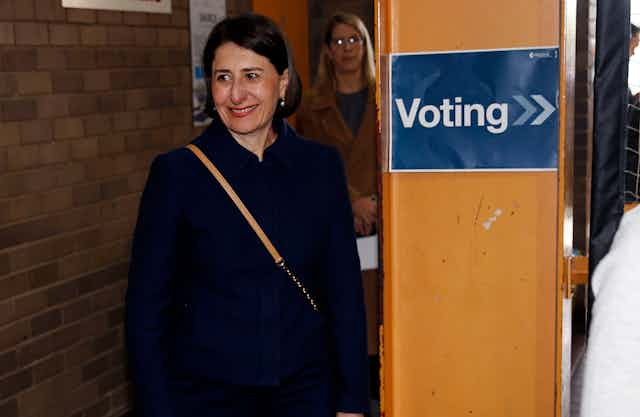A recent Resolve poll of New South Wales voters for The Sydney Morning Herald has given the Coalition 44% of the primary vote, Labor 28%, the Greens 12% and the Shooters Fishers and Farmers 4%. This is the first nonpartisan poll of NSW state voting intentions since the last election.
At the March 2019 election, primary votes were Coalition 41.6%, Labor 33.3%, Greens 9.6% and Shooters 3.5%.
No two-party estimate was provided by Resolve, but analyst Kevin Bonham estimates this means 56-44 to the Coalition, compared with 52-48 at the election. The poll was conducted with two federal Resolve polls in mid-April and mid-May from a sample of 1,228.
Premier Gladys Berejiklian led Labor leader Jodi McKay as preferred premier by a massive 57-17 margin. Half of those polled thought Berejiklian likeable, while 17% were negative. Meanwhile, 13% thought McKay likeable, while 21% were negative (this includes don’t know and neutral responses).
Nationals easily win Upper Hunter byelection
There was a byelection in the state seat of Upper Hunter on Saturday. With 84% of enrolled voters counted, the Nationals defeated Labor by a 55.7-44.3 margin, a 3.1% swing to the Nationals from the 2019 election. Primary votes were 31.2% to the Nationals (down 2.8%), 21.3% to Labor (down 7.3%), 12.3% to One Nation, 12.0% to the Shooters (down 10.1%) and 12.9% for two independents combined.
The total vote for the major parties fell 10.1% to 52.5%, but with a large field of candidates, the National and Labor candidates were certain to finish in the top two after preferences, especially given NSW’s optional preferential voting system.
The Shooters won three seats at the last state election, but will need to come to an agreement with One Nation not to contest the other party’s target seats at the next election.
Read more: Little change in post-budget Newspoll; Liberals win Tasmanian majority
This is the lowest primary vote for the Nationals in what was a safe Nationals seat before the rise of the Shooters and One Nation. For Labor, it is their second lowest primary vote, beating only the 17.9% at the 2011 Labor annihilation.
Overall preference flows from all third party candidates were 20.5% to Labor, 16.3% to the Nationals and 63.2% exhausted. Including exhausted ballots, two party vote shares were 39.0% Nationals (down 0.9% since 2019), 31.0% Labor (down 5.0%) and 30.0% exhausted (up 5.8%). That’s the lowest Nationals share by this measure.
The byelection was caused when former member Michael Johnsen was accused of sexually assaulting a sex worker — he denies any wrongdoing. Other factors that would normally be expected to drag the Nationals vote down are the loss of Johnsen’s personal vote, having a federal government of the same party, and the ten-year age of the current NSW Coalition government.
Read more: Has a backlash against political correctness made sexual misbehaviour more acceptable?
The byelection result and the Coalition’s big lead in the state NSW poll are both dire for NSW Labor. And it’s another example of sex scandals not impacting actual votes.
At the last election, the Coalition won 48 of the 93 lower house seats, one more than the 47 needed for a majority. They have lost two members to the crossbench, so winning this byelection still puts them in minority government with 46 seats. The Coalition is in no danger of losing a confidence vote.
Federal Resolve poll
In the federal Resolve poll for the Nine newspapers, conducted April 12-16 from an online sample of 1,622, primary votes were 39% to the Coalition (up one since April), 35% for Labor (up two), 12% to the Greens (steady) and 2% to One Nation (down four). From these primary vote figures, Bonham estimates Labor is in front, 51-49, a one-point gain for Labor since April.
It is likely One Nation’s large drop reflects Resolve adopting Newspoll’s methods on the One Nation vote, and they are now only asking for One Nation in seats they contested at the 2019 election.
Read more: Great approach, weak execution. Economists decline to give budget top marks
More than half (53%) gave Prime Minister Scott Morrison a good rating for his performance in recent weeks, and 38% a poor rating; his net +15 rating is up three from April. Labor leader Anthony Albanese was at 32% good, 45% poor, for a net of -13, down seven points. Morrison led Albanese by 48-25 (compared to 47-25 in April).
On economic management, the Coalition and Morrison led Labor and Albanese by 46-20 (43-21 in April). On handling COVID, the Coalition led by 46-20 (42-20 in April).
Resolve had far stronger approval for the budget than Newspoll. More than half (56%) rated it good for the country and just 10% poor (for a net +46). Meanwhile 35% rated it good for their personal finances and 17% poor (net +18). Treasurer Josh Frydenberg had a +31 net rating, while Shadow Treasurer Jim Chalmers was at -3.
Newspoll and the budget
In additional Newspoll questions, released last Tuesday, more voters trusted a Coalition government led by Morrison over a Labor government led by Albanese to guide Australia’s COVID recovery (52-33 voters, compared to 54-32 last October).
Of those surveyed, 60% of voters thought the government was right to stimulate the economy despite increased debt, while 30% said it should do more to rein in spending. During Labor’s last period in government, the Coalition ranted about debt and deficit, but now 71% of Coalition voters support increased debt.
The Newspoll also found many voters thought Labor would not have delivered a better budget (46-33). Bonham says the 13-point margin is typical by recent standards after the 49-33 result following the 2020 budget.

